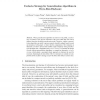Free Online Productivity Tools
i2Speak
i2Symbol
i2OCR
iTex2Img
iWeb2Print
iWeb2Shot
i2Type
iPdf2Split
iPdf2Merge
i2Bopomofo
i2Arabic
i2Style
i2Image
i2PDF
iLatex2Rtf
Sci2ools
103
click to vote
DBSEC
2008
2008
Exclusive Strategy for Generalization Algorithms in Micro-data Disclosure
Abstract. When generalization algorithms are known to the public, an adversary can obtain a more precise estimation of the secret table than what can be deduced from the disclosed generalization result. Therefore, whether a generalization algorithm can satisfy a privacy property should be judged based on such an estimation. In this paper, we show that the computation of the estimation is inherently a recursive process that exhibits a high complexity when generalization algorithms take a straightforward inclusive strategy. To facilitate the design of more efficient generalization algorithms, we suggest an alternative exclusive strategy, which adopts a seemingly drastic approach to eliminate the need for recursion. Surprisingly, the data utility of the two strategies are actually not comparable and the exclusive strategy can provide better data utility in certain cases.
Database | DBSEC 2007 | DBSEC 2008 | Efficient Generalization Algorithms | Exclusive Strategy | Generalization Algorithms |
| Added | 09 Nov 2010 |
| Updated | 09 Nov 2010 |
| Type | Conference |
| Year | 2008 |
| Where | DBSEC |
| Authors | Lei Zhang 0004, Lingyu Wang, Sushil Jajodia, Alexander Brodsky |
Comments (0)

